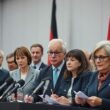The postponement of Foreign Minister Annalena Baerbock’s planned trip to China next week has drawn criticism from within Germany’s parliamentary ranks, with leading figures warning of a potential setback in efforts to mend strained bilateral relations. Adis Ahmetovic, the SPD’s foreign policy spokesperson in the Bundestag, voiced his disappointment, characterizing the abrupt cancellation as “not a good signal” for an improvement in the increasingly complex dynamic between Berlin and Beijing.
The German Foreign Ministry cited a lack of sufficient engagement from the Chinese side as the reason for the postponement. While a meeting between Baerbock and her counterpart, Wang Yi, had been confirmed, other crucial appointments had not materialized, prompting the decision to reschedule. This apparent reluctance from Beijing highlights a growing disconnect, occurring at a time when direct engagement is deemed critically important amidst escalating global tensions.
Ahmetovic emphasized the necessity of maintaining a continuous dialogue with China, particularly concerning issues of peace, security, economic stability, trade and human rights. He underscored the potential for damaging consequences arising from ongoing export restrictions on raw materials and microchips, a key point of contention between the two nations. “We need solutions” Ahmetovic stated, stressing that these restrictions are impacting all parties involved.
The incident throws into sharp relief the challenges facing Germany’s foreign policy aims regarding China. While Berlin seeks to re-establish pathways for diplomatic engagement and address key economic concerns, Beijing’s willingness to engage on a comprehensive level remains questionable. The postponed visit raises concerns that Germany’s efforts to navigate a pragmatic yet principled relationship with China may be encountering unexpected barriers, potentially hindering broader European strategies for managing global instability and economic interdependence. Analysts suggest that a reassessment of approach might be necessary to overcome these hurdles and foster a more constructive and reciprocal relationship.





